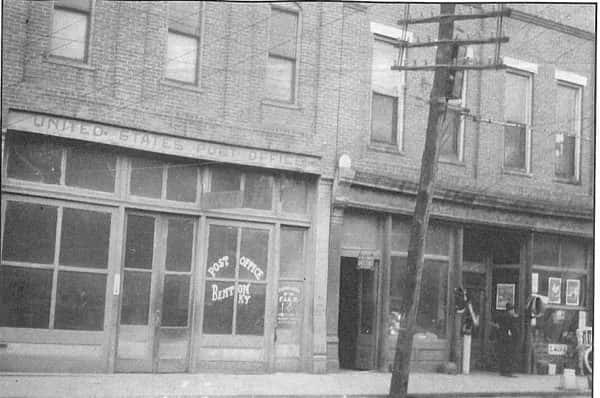Embezzlement Scandal of Robert I. Blagg
Written by Justin D. Lamb

It was 1910 and prospects were looking good for Robert I. Blagg, the newly elected circuit clerk of Marshall County. At twenty-four years of age, Blagg was quickly becoming one of Marshall County’s most distinguished politicians and was expected to go far in the local political scene. However, it wasn’t long before his career went up in smoke when he was caught up in a corruption scandal which eventually ruined his political career.
The son of Thomas Blagg and Martha York Blagg, Robert Isaac Blagg was born on December 21, 1886 in Marshall County. He spent his childhood working on his father’s farm in the Brewers community until October 21, 1906, when he married Miss Effie McGregor and the couple moved to Benton. Shortly after, Blagg became an insurance salesman and became an active member of the Benton Baptist Church where he served as treasurer. By 1910, Blagg was involved in local Democratic politics and soon was easily elected to the office of Circuit Clerk.
After only three years as Circuit Clerk, Blagg resigned and assumed the duties as Postmaster of Benton in May 1913. His chief deputy, A.A. “Arch” Nelson, was appointed to take his place. A special election was called the following November to fill the unexpired term of the Blagg and Nelson was defeated by George Slaughter who also served as deputy clerk under Blagg. During the late hours of December 16, 1914, the Marshall County Courthouse was burned to the ground and it was first thought that Circuit Clerk Slaughter had perished in the fire. However, it was later discovered that Sluaghter had fled and he was later apprehended in Cairo, Illinois. Slaughter was charged with arson and brought back to Benton for questioning. During an investigation, Slaughter stated that the fire was an accident and he fled because “he didn’t want to be thought responsible for the crookedness of a former official.” Sheriff Joe Darnall asked Slaughter which former official he was talking about. Slaughter replied, “Robert Blagg.” Slaughter told Commonwealth Attorney John G. Lovett and Sheriff Darnall that he was not going to take the fall for Blagg. Slaughter told the Sheriff that there were discrepancies in the books under Blagg and Arch Nelson’s administrations. However, with all the records destroyed in the fire there was no way to investigate Blagg or Nelson, whom both denied the charges and stated that Slaughter was trying to use them as a scapegoat. Slaughter was eventually charged with arson and served seven years in the penitentiary for the burning of the courthouse.

As the excitement of the courthouse fire died down in January 1915, Blagg approached his friends Arch Nelson and County Judge Joe Price and told them that he had a six hundred dollar shortage in his funds at the post office. Blagg said that the yearly audit was coming up and that he needed to make good the money or he would lose his job. Judge Price and Nelson loaned him the money to pay back the missing funds.
The following year in April, an audit of all Benton Post Office books was conducted and it was discovered that two hundred dollars of postal funds were missing. Federal authorities were immediately notified and Blagg was placed under arrest for embezzlement of post office funds. When questioned, Judge Price and Arch Nelson told authorities about the incident that happened a year prior and shortly after being arrested, fifty dollars was discovered missing from the Benton Baptist Sunday School fund in which Blagg, Price, and Nelson, were members. Blagg was accused of stealing the money and he was brought before County Judge Joe Price who imposed a fine and ordered him to pay back the money. Blagg was then taken to Paducah to face his charges of stealing postal funds.

Benton Post Office, 1910s
On April 19, 1916, Blagg was brought before Federal Judge Walter Evans in United States Court in Paducah. Judge Evans read the charge of embezzlement and Blagg pleaded guilty. Blagg pleaded with the judge to let him off with a fine, but Judge Evans refused stating that Blagg had breached the trust placed in him as postmaster and that he deserved a more severe penalty. Before slamming down his gavel, Judge Walters pronounced, “It is the judgment of the court that you be confined in the United States Penitentiary for one year and six months.” Blagg begged the judge to let him serve his time in the McCracken County or Marshall County jail, but the judge refused.
Before leaving to serve his sentence in Atlanta, Georgia, Blagg was interviewed by a Paducah Sun-Democrat reporter at the McCracken County jail. During the interview, Blagg told the reporter, “I could open my mouth and tell what I know and I would have plenty of company in the federal prison.” Blagg went on to imply that other county officials were involved in numerous corrupt matters and that George Slaughter was the “fall guy” for the courthouse fire. Blagg went on to say, “It is not a connection with the shortage of postal funds, but is connected with another matter that happened prior to that. I will say nothing and will take my medicine like a man and those men whom I thought where my friends to go free.” Blagg explained why he took the money, “I took the government funds after I became mixed up in the politics at Benton.” Blagg admitted he took the money from the post office, but he insisted that he never took any money from the Benton Baptist Sunday School, but that was a charge made up by County Judge Joe Price and Arch Nelson in order to discredit him and keep the heat off of them.
The arrest and conviction of Robert Blagg sparked sympathy on the part of many who knew Blagg as good person and could not believe he stole money from the government. After serving his time in federal prison, Blagg returned to Marshall County and he became a salesman for a steel corporation. Blagg lived in Benton until his death at the young age of forty-one in 1927.
